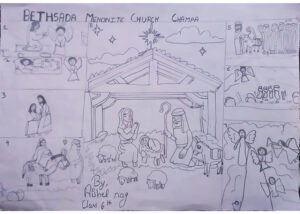The irony wasn’t lost on me, or on others. At last summer’s Mennonite Church Canada assembly, people discussed, debated and discerned holy sexuality. Specifically, they considered, “Is there space in Mennonite churches for people who are in same-sex relationships?”
The decision by that delegate body—after a six-year, highly participatory process—was yes. Let us provide church space for those who are same-sex attracted; let us accept and live with the differing understandings we have on this aspect of sexuality.
The irony came from one of the gathering’s optional activities: a play in a charming, rural theatre with engaging, talented actors. The plot of yearning and love, and loss and hope, unfolded with heaps of physical and verbal humour. It also included—and here’s the irony—a several-minutes-long scene of simulated sexual intercourse between an unmarried man and a married-to-someone-else woman, what could be called adultery or fornication, even sin.
Yes, it was a farce and wildly unrealistic. I don’t think the play was intended to offer much more than a good laugh, although that could be debated. At the time, I felt mildly disturbed; something made me uncomfortable. Later, I put words to my uneasiness. Acted out on stage was a quite-obvious depiction of intercourse in a public work of art promoted during a church assembly.
This violated some implicit trust, I felt. Had I missed the “explicit sexual content” warning in the material? Was I right to feel wronged? Did others have a similar reaction? At least one person referred to the play during the next day’s delegate discussion, naming it as sin and tying it to other sexual sins.
What does holy or unholy sexuality look like today? Is it different from the past? How is the church helping or hindering us in becoming holy children of God, reflecting God’s image, particularly in our bodies and with our expressions of sexuality? Where does the Bible help us? And where is it limited? Does a preoccupation with same-sex relationships blind us to attending to sexual ethics for all?
I applaud the brave efforts of pastors, parents and youth leaders who do venture into this sacred, fraught space. God knows we cannot depend on our confused, sex-saturated society to lead the way in holy sexual ethics. I do believe, though, that the Bible, taken in context, can help us.
For starters, we can look at the Apostle Paul’s writings. We might not immediately think he has much to offer. However, his words to the Corinthians are worth pondering. One principle of healthy, holy sexuality is mutuality—respect, desire and pleasure—that is grounded in equality. As Paul says, “In the Lord, woman is not independent of man or man independent of woman. For just as woman came from man, so man comes through woman; but all things come from God” (I Corinthians 11:11-12). And, “the husband should give to the wife her conjugal rights, and likewise the wife to her husband” (I Corinthians 7:3).
To return to the play, it appeared that one of the partners had not consented to sexual activity, not in keeping with Paul’s understanding of mutual respect and dignity. Paul clearly understood that Jesus’ self-giving love had created a new power dynamic, erasing domination and manipulation, and levelling formerly divisive categories. In Jesus’ new community, everyone is equal. Jesus ushers in an astounding transformation in all relationships, including those between sexual partners.
Or that’s what Paul earnestly points us toward. We are still trying to live out the reality of Jesus’ revolution. May we mine the Bible for insights, trust the Spirit’s guidance, and aim to live out holy sexuality as a mirror of God’s love.
Melissa Miller (familyties@mymts.net) has a passion for helping people develop healthy, vibrant relationships with God, self and others.







Leave a Reply
You must be logged in to post a comment.